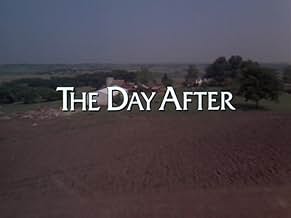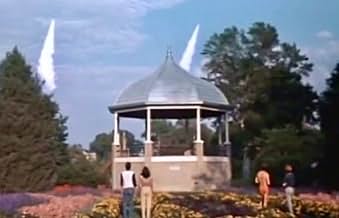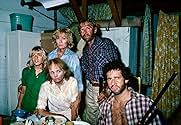Ajouter une intrigue dans votre langueThe effects of a devastating nuclear holocaust on small-town residents of eastern Kansas.The effects of a devastating nuclear holocaust on small-town residents of eastern Kansas.The effects of a devastating nuclear holocaust on small-town residents of eastern Kansas.
- A remporté 2 prix Primetime Emmy
- 6 victoires et 11 nominations au total
Steve Guttenberg
- Stephen Klein
- (as Steven Guttenberg)
Histoire
Le saviez-vous
- AnecdotesThe program originally aired on November 20, 1983. It remains the most-watched TV movie in U.S. history. Estimates put the viewership at over 100 million Americans, with a Nielsen share of 62 percent.
- GaffesWhen Dr. Austin (Lin McCarthy) is explaining the effects of the electromagnetic pulse (EMP) from the nuclear blast, he says. "It's all theoretical. It's never happened before." In actuality, the United States detonated a 3.8 megaton warhead at an altitude of 50 miles, 1 August 1958, in the Operation Hardtack Teak shot nuclear test. This event caused unexpected communications disruption and damage to electrical equipment in an area that ranged between Hawaii and New Zealand. It was the first observation of the EMP effect.
- Citations
Joe Huxley: You know what Einstein said about World War III? He said he didn't know how they were gonna fight World War III, but he knew how they would fight World War IV: With sticks and stones.
- Générique farfelu[After movie has ended, before end credits.] The catastrophic events you have just witnessed are, in all likelihood, less severe than the destruction that would actually occur in the event of a full nuclear strike against the United States. It is hoped that the images of this film will inspire the nations of this earth, their peoples, and leaders to find the means to avert that fateful day.
- Autres versionsThe rare laserdisc version (released by Image Entertainment in 1995) is advertised as being a director's cut. This version runs 127mins, is widescreen in its proper ratio of 1:75:1 and has a commentary track by director Nicholas Meyer. At the time of this release full versions of the film were not readily available. So it stands to chance this director's cut is actually the same as the current mgm dvd (US region 1) as far as content and running time goes, with the exception of the widescreen format and commentary track which so far has only be found on this laserdisc.
- ConnexionsEdited from Two-Minute Warning (1976)
Commentaire en vedette
I was a naval aviator deployed aboard the USS Ranger (CV-61) when I first saw this film. The show had aired back in the States some time before the film reels (this was before video tape decks were commonplace) were flown out to our Battle Group, so we knew that the telecast had had a big impact on the American public before we had the chance to view it.
That didn't matter. The film had as great, and possibly even more of, an impact on those of us out on the "tip of the spear" as it did on those back home. The military characters seen in the film were not actors -- they were contemporaries of ours, some even familiar faces -- so we felt a true connection to the story. The tension between the US and the Soviet Union was real and nobody knew better than we how nasty things could get in a short period of time. Even as we watched the film over the ship's closed circuit television system, Soviet military units were intent on locating and targeting our Battle Group. Our job, our daily routine, was part of the story, which emphasised the point that we were responsible for keeping the peace and to not allow events to escalate as we all feared could happen.
The reaction I remember most from this film was worry for family back home. -SPOILER- The one airman who left the silo area to reach his family before the missiles arrived displayed a sentiment that we all felt. No one aboard our ship would shirk his duty, but we all understood the sentiment that once duty is done, family is foremost in mind.
The argument could be made that the film was rife with error, but I maintain that it ultimately succeeded in what it was designed to do...make people seriously consider the consequences of nuclear war. That point was not lost on those of us aboard the Ranger at the time. While I watched the film again just recently (21 years after the first viewing), the lesson was still not lost. We may or may not be vulnerable to such a massive strike as what was feared back in the 1980s, but nuclear terror is still a very real possibility. It is as imperative now, as it was then, that we ensure that this type of calamity is never visited upon anyone, especially those about whom we love and care.
Yes, better special effects would make from some jaw-dropping images, but would that improve upon the film's message? In my opinion, no.
That didn't matter. The film had as great, and possibly even more of, an impact on those of us out on the "tip of the spear" as it did on those back home. The military characters seen in the film were not actors -- they were contemporaries of ours, some even familiar faces -- so we felt a true connection to the story. The tension between the US and the Soviet Union was real and nobody knew better than we how nasty things could get in a short period of time. Even as we watched the film over the ship's closed circuit television system, Soviet military units were intent on locating and targeting our Battle Group. Our job, our daily routine, was part of the story, which emphasised the point that we were responsible for keeping the peace and to not allow events to escalate as we all feared could happen.
The reaction I remember most from this film was worry for family back home. -SPOILER- The one airman who left the silo area to reach his family before the missiles arrived displayed a sentiment that we all felt. No one aboard our ship would shirk his duty, but we all understood the sentiment that once duty is done, family is foremost in mind.
The argument could be made that the film was rife with error, but I maintain that it ultimately succeeded in what it was designed to do...make people seriously consider the consequences of nuclear war. That point was not lost on those of us aboard the Ranger at the time. While I watched the film again just recently (21 years after the first viewing), the lesson was still not lost. We may or may not be vulnerable to such a massive strike as what was feared back in the 1980s, but nuclear terror is still a very real possibility. It is as imperative now, as it was then, that we ensure that this type of calamity is never visited upon anyone, especially those about whom we love and care.
Yes, better special effects would make from some jaw-dropping images, but would that improve upon the film's message? In my opinion, no.
- sparks401
- 8 févr. 2005
- Lien permanent
Meilleurs choix
Connectez-vous pour évaluer et surveiller les recommandations personnalisées
Détails
Contribuer à cette page
Suggérer une modification ou ajouter du contenu manquant

Lacune principale
By what name was Le jour d'après (1983) officially released in Canada in English?
Répondre































